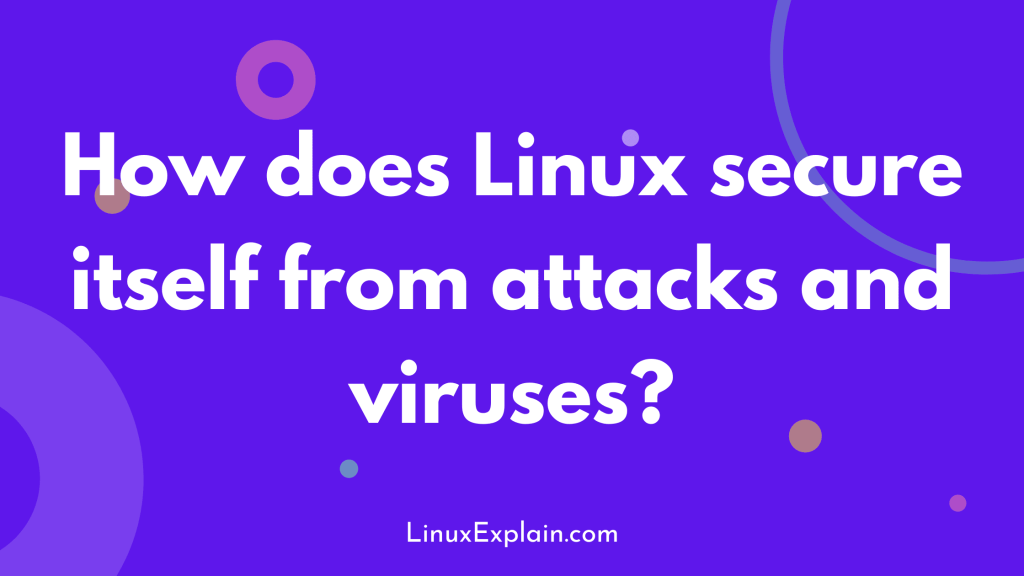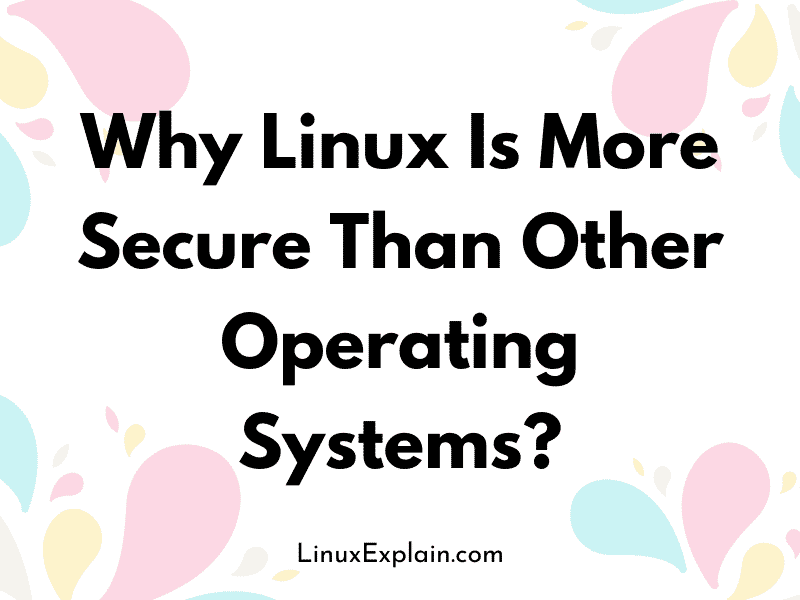Linux is more secure than other operating systems. It has a well-defined set of security guidelines that are followed by the developers. This ensures that the system is able to protect itself from viruses and malware.
Moreover, Linux has a robust security infrastructure, which includes firewalls, intrusion detection and prevention systems (IDPS), and security audit trails.
Why Linux Is More Secure Than Other Operating Systems?
When it comes to security, Linux is the clear winner. It’s more secure by design, and this is because it has a much more modular operating system architecture. This means that vulnerabilities can be fixed more easily and quickly, as they don’t have to affect the entire system.
In addition, Linux systems are built from the ground up with security in mind. Which means that they’re harder to hack. So if you’re looking for a more secure operating system, choose Linux!
CentOS Linux is more secure than Windows
Windows users may be familiar with the security model of operating systems, which relies on users logging in to the system and granting access to authorized users. CentOS Linux, on the other hand, uses a different security model called Multiple Sign-on (MSA). With MSA, multiple users can share the same login credentials, which makes it a better choice for businesses that need increased security.
By default, CentOS Linux uses SELinux to protect your system from unauthorized access. Additionally, it has several other security features like encrypted user files and system logs that can help you keep track of activity on your system.
So, if you’re looking for a more secure operating system, CentOS Linux is a good option to consider!
Ubuntu Linux is more secure than Windows
We all know that Windows is not the most secure operating system out there. However, for some people, it’s the best option available. Ubuntu Linux, on the other hand, is a more secure option and is growing in popularity because of it.
Ubuntu Linux uses a different approach to security that has proved to be more effective than Windows in the past. Additionally, Ubuntu Linux has made great strides in the area of security over the years, which makes it a better choice for people who are looking for a more secure operating system.
Arch Linux is more secure than Windows
Windows may be the default operating system for most people, but that doesn’t mean it’s the best option for security. There are several security benefits to using Arch Linux instead.
First, Arch Linux offers a more secure platform overall, due to its use of an isolation kernel and security measures like SELinux.
Additionally, Arch Linux uses an updated version of the Linux kernel, which is known to be more secure than the default kernel found in Windows.
Finally, Arch Linux uses a different security model than Windows, which makes it less vulnerable to vulnerabilities. If you’re looking for a secure operating system that offers a variety of benefits, Arch Linux is a great option.
Debian Linux is more secure than Windows
Windows is a popular operating system, but it’s not the only game in town. Debian Linux is a popular Linux distribution that is more secure than Windows. This is because Debian has a variety of security features, including encrypted files and passwords, automatic updates, and multiuser support.
Additionally, Debian offers a wealth of software options that are not available on Windows. If you’re looking for a supported Linux distribution with tons of goodies besides security, Debian might be the choice for you!
Is Linux more secure by design?

Many people believe that Linux is more secure by design because of its open-source nature. This allows for updates and modifications to the software, which increases its security.
Windows Vista, on the other hand, has some security vulnerabilities that Linux does not have. This is why, if you’re looking for a platform that’s more secure by design, choose Linux!
How secure is Windows?
Windows is a very secure operating system and there are many ways to protect yourself from online threats. One of the best ways to do this is by installing protective software on devices that connect to the internet, like your laptop or smartphone.
Keep your files and folders locked down to help prevent unauthorized access. Windows also comes with several security features that make it difficult for attackers to exploit vulnerabilities. For example, Windows uses security features like digital signatures and Trusted Platform Module (TPM) to help protect system files and data.
Additionally, Windows comes with the Windows Defender security system to detect and prevent malware attacks.
(FAQs)
Why is Linux more secure than Windows?

Linux is more secure than Windows because it has a system security architecture that focuses on user control and protection. Linux systems are typically configured with a variety of security mechanisms, such as firewalls and rootkits, that help protect against malicious activity.
What are the benefits of using Linux?
Benefits of the Linux desktop operating system include security and system stability. Additionally, open-source software allows users to customize the system to their own needs.
Is Linux more secure than other operating systems?
There are many security vulnerabilities in operating systems such as Windows, Mac OS X, and Linux, but the advantage of Linux is that there are many more developers who are working on improving the security of Linux.
Indeed, according to the Open Source Security Survey Report 2015, more than 50% of open-source software projects aim to make their code more secure.
What are the best Linux security tips?
The open-source security community maintains a list of frequently asked questions (FAQs) on Linux security issues. The Linux Security Summit tracks recent Linux security developments and offers security tips from leading experts in the field.
What is Linux and why is it more secure than other operating systems?
Linux is an operating system created by Linus Torvalds. It is more secure than other operating systems because it has fewer vulnerabilities.
How does Linux secure itself from attacks and viruses?

Linux secures itself from attacks and viruses by using various security features, including user accounts with user-defined passwords, file system security, and malware detection software.
Why is Linux a good choice for server and desktop use?
Linux is a good choice for server and desktop use because it is free, open-source, and versatile.
What are some of the criticisms of Linux?
Some of the criticisms of Linux are that it is hacker-friendly, can be difficult to use for new users, and there is no standard desktop interface. The operating system is open-source, which allows users to modify or improve it.
What are some of the Linux security advantages that are most important to businesses and consumers?
Some of the Linux security advantages that are most important to businesses and consumers include:
- Linux is widely used and supported, meaning there is a large community of users who can help identify and report security issues.
- Linux is open-source, which allows for easy customization and modification. This makes it more secure because there is a wide variety of security features available from third-party developers.
- Linux is lightweight and uses fewer system resources than other operating systems. This makes it more resistant to malware attacks and helps improve system performance.
What are the implications of Linux security superiority for businesses and consumers?
MMORPGs are one of the most popular uses for Linux. According to a study by market research company IDC, Linux is the operating system of choice for more than one-third of MMORPG players.
In addition, a 2016 study by security provider Bitdefender found that Linux systems are three times as likely to be infected with malware than Windows systems.
Why is Linux the most secure OS?
Linux is the most secure OS because it has a variety of security features that other operating systems do not. Linux also has a large user base which helps to keep security vulnerabilities fixed and up to date.
What is a secure OS/kernel?
A secure operating system or kernel is a computer system that ensures data security by protecting user information and system resources.
What are some common misconceptions about Linux and Unix?
A few common misconceptions about Linux and Unix include the belief that they are operating systems only used by techies, the belief that they are open source, and the belief that they are difficult to use.
Why are there no viruses on the Linux OS?

The Linux operating system does not rely on a microprocessor like Windows and Mac OS, which are vulnerable to viruses. By not having these vulnerable components, Linux is immune to viruses.
Is Linux-based OS more secure than Windows OS and why?
Linux is based on open source code, which makes it more secure than Windows because more eyes are looking at the code.
Is Linux security bad?
Linux security has been cited as one of the strong points of Linux. The open-source operating system is widely used and has a large user base, meaning that there is more opportunity for developers to patch vulnerabilities.
In addition, the overall design of Linux prevents many types of malware from exploiting vulnerabilities in the operating system.
What makes Linux so secure?
Several factors make Linux extremely secure. Including the open-source model, security features built into the operating system, and its widespread use.
What would you say are the most important things I need to know about setting up my system before installing a distro if any?
The most important things to know before installing a distro include:
- Which distribution you would like to install
- The system specifications
- And how to burn the image to disk.
For more information, please see the following sources:
- Ubuntu Installation Guide
- Fedoras Installation Guide
- System76s Installation Guide
Is there a difference between a distro and an OS, or is it just semantics?
A distro is a system of operating systems and software, while an OS refers to the operating system itself.
Why should I use Linux instead of Windows on my laptop or computer at home or work?
There are many reasons to choose Linux over Windows when using a laptop or computer at home or work. First and foremost, Linux is open source, meaning that the code for it is available to be viewed and studied by anyone. This allows for better customization and control of the system, as well as enhanced security.
Linux is typically much faster and more reliable than Windows when running basic tasks such as internet browsing, word processing, and photo editing. Finally, Linux is often cheaper to maintain than Windows systems, making it an economical choice in the long run.
How does Linux work and why is it more secure than other operating systems?
Linux is a distributed operating system that consists of many different software modules that work together to provide a user interface. Each software module performs a specific task. And when these modules are run in unison, they form the operating system kernel.
Linux kernels are typically more secure than Windows kernels because they are not as vulnerable to attack. For example, malware that targets vulnerabilities in Windows kernel components will not work on a Linux system.
Additionally, Linux distributions automatically update the kernel components, which helps to keep them up-to-date and secure.
What are some good distros for home users and/or small businesses that aren’t too technical?
Some distros you may want to consider are openSUSE, Ubuntu, Fedora, and CentOS.
What is the best way to get started with Linux as a desktop user?
The best way to get started with Linux as a desktop user is through the use of distribution such as Ubuntu or Linux Mint.

